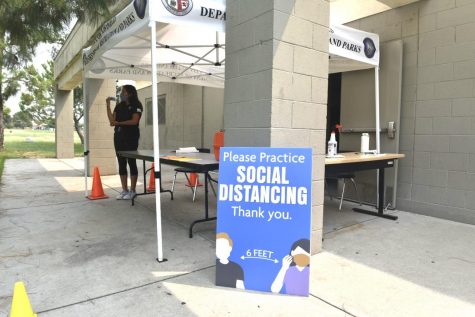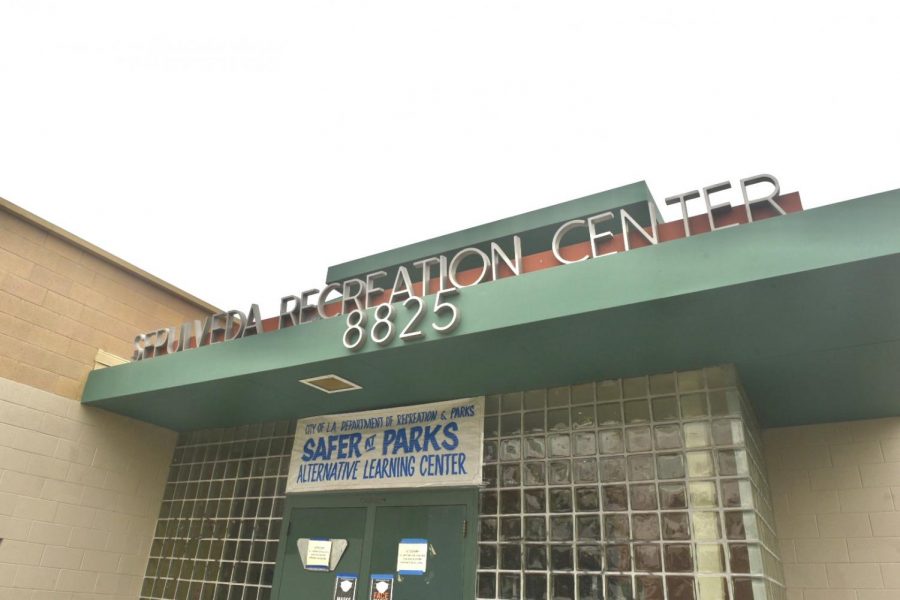City of Los Angeles launches “Safer at Parks,” an alternative to at home learning
The Sepulveda Recreation Center is a learning center for LAUSD students as part of the “Safer at Parks” program. Spots are limited to 24 participants per location.
September 8, 2020
The Los Angeles City Department of Recreation and Parks launched the “Safer at Park”s program on Aug. 31 to provide elementary and middle school students with internet access and a secure environment to facilitate distance learning.
Since returning to school, many students and parents have struggled to access the necessary virtual class materials. As students continue distance learning from home, the gap in resources significantly affects low-income families in L.A. County.
The “Safer at Parks” program is offered to elementary and middle school students enrolled in the Los Angeles Unified School District. This initiative offers a full-day schedule including meal times, homework help and extracurricular activities.
“Internet is costly. They really wanted to make sure the whole program is to help out low-income families and make sure that no kid is left behind.”
– Rose Watson
Public information director at the Department of Recreation and Parks
In L.A. County, about one out of every four families do not have the resources for children to effectively participate in distance learning, according to a USC Annenberg report.
The idea was brought to the L.A. City Council following the success of the Summer Day Camp, organized by the recreation and parks department, according to Rose Watson, the public information director at the recreation and parks department.
“Internet is costly. They really wanted to make sure the whole program is to help out low-income families and make sure that no kid is left behind,” Watson said.
After getting approval from the city council, the recreation and parks department was awarded $10 million to operate at 50 recreation centers across the city through December.
These funds provide students with wireless internet and afterschool activities in supervised facilities while adhering to the L.A. County Department of Public Health and Centers for Disease Control and Prevention COVID-19 guidelines.
“The activities are non-contact, so we are doing everything to make sure that when parents bring their kids to the park, they are in a safe, structured environment,” Watson said. “That limits the concern about the spread of COVID-19.”
Students are required to bring their own laptops or tablets and headphones to the alternative learning site, and the login information to their respective online classrooms.
Fees associated with the program vary by location, with some sites offering the program at no cost, and others charging $150 per week. Some locations provide free breakfast, lunch and snacks to students, with a menu similar to what they would receive at school.
Each site has a capacity of 24 students, with two adults responsible for overseeing the group.
Participating staff and students are screened, which consists of a temperature check, before entering the building. Students are also required to wear face masks to participate in the day’s activities.
The students are supervised by an assistant director and the main director at the site. The team works together to ensure a distraction-free experience for the children during remote learning.

The “Safer at Parks” staff are known as “coaches,” as described by Watson. They act as supervisors and an additional support system for the students.
The coaches answer students’ questions and provide homework help after school. They are also responsible for planning activities, such as no-contact physical exercise and reading sessions, to keep the students entertained until their guardians pick them up.
“The kids feel like it’s not the same as school, but it’s as close as possible to being at school,” Watson said. “[The coaches] try to give them some sense of normalcy, they get a sense of socializing because they have some kids there.”
Since the program’s inception, the department’s page on LAcity.org has attracted over 900 registrations of the program’s capacity of 1400, according to Watson.
Watson described one parent who was concerned about splitting her time between a full day’s work and aiding her children’s coursework.
“She didn’t know how she was going to be able to make sure to be home with them,” Watson said. “She had to go part-time so that she could make sure her kids log-in and do their virtual learning.”
After learning about the summer program and its predecessor, Safer at Parks, the parent enrolled both of her children through the department’s web page and was able to return to working full-time.
“We encourage our parents to look into it, it’s a safe, structured program,” Watson said. “We’re all supportive of our youth and we want them to continue to thrive.”
For information on internet options, visit Digital Inclusions for Angelenos.
